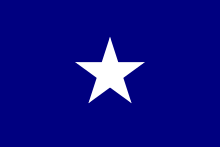Fulwar Skipwith
Fulwar Skipwith | |
|---|---|
 | |
| President of the Republic of West Florida | |
| In office September 27, 1810 – December 10, 1810 | |
| Vice President | Thomas B. Robertson |
| Preceded by | Office established |
| Succeeded by | Office abolished |
| Personal details | |
| Born | February 21, 1765 Dinwiddie County, Virginia |
| Died | January 7, 1839 (aged 73) Baton Rouge, Louisiana |
| Nationality | American |
| Profession | Diplomat, Politician, Farmer |
Fulwar Skipwith (February 21, 1765 – January 7, 1839) was an American diplomat and politician, who served as a U.S. Consul in Martinique, and later as the U.S. Consul-General in France. He was the first and only Governor of the Republic of West Florida in 1810.
Early life
Skipwith was born in Dinwiddie County, Virginia, and was a distant cousin of U.S. President Thomas Jefferson. Skipwith studied at the College of William & Mary, but left at age 16 to enlist in the army during the American Revolutionary War. He served at the Siege of Yorktown in 1781. After American independence was achieved, he entered the tobacco trade.
Diplomatic career & family
Following the French Revolution of 1789, Skipwith was appointed as US Consul to the French colony of Martinique in 1790. He experienced the turmoil of the Revolution, as well as the aftermath of the abortive slave insurrection in Martinique, before departing in 1793.[1] In 1795, Skipwith was appointed Consul-General in Paris under the US Minister to France, James Monroe.
On June 2, 1802, Fulwar Skipwith married Evelina Louisa Barlié Van den Clooster, a Flemish baroness. Their children were Lelia, who married Thomas B. Robertson; Evelina, who married Edward H. Barton; and George Grey Skipwith.[2]
Republic of West Florida

In 1809, Skipwith moved to Spanish West Florida. As a member of the first West Florida judiciary, he took part in the 1810 West Florida rebellion against Spain, and served as Governor of the short-lived Republic of West Florida. On October 27, 1810, West Florida was annexed to the United States by proclamation of U.S. President James Madison, who claimed it as part of the Louisiana Purchase.
At first, Skipwith and the West Florida government – located in St. Francisville – were opposed to the proclamation, preferring to negotiate terms to join the Union as a separate state. However, the Territory of Orleans Governor, William C. C. Claiborne, who was sent in to take possession (December 1810), refused to acknowledge the legitimacy of the West Florida government. Skipwith and the legislature reluctantly agreed to accept Madison's proclamation.
Later life
Skipwith was elected to serve in the Louisiana State Senate where he served as that body's second President. In December 1814, during the War of 1812, Magloire Guichard and Skipwith sponsored a legislative resolution to grant amnesty to "the privateers lately resorting to Barataria, who might be deterred from offering their services for fear of prosecution." This led to Jean Lafitte[3] and his men joining in the defense of New Orleans during the Battle of New Orleans, when the city was attacked by British forces.
In 1827, Skipwith, Armand Duplantier, Antoine Blanc, Thomas B. Robertson, and Sebastien Hiriart received permission from the Louisiana State Legislature to organize a corporation called the Agricultural Society of Baton Rouge.[4] The purpose of the society was as follows, "The sole and special objects of the said society shall be the improvement of agriculture, the amelioration of the breed of horses, of horned cattle, and others, and in all of the several branches relative to agriculture in a country."[4]
Skipwith died at his Montesano plantation near Baton Rouge on January 7, 1839, at age 73.
References
- ^ Chenicek, Jolynda Brock (2008), Dereliction of Diplomacy: The American Consulates in Paris and Bordeaux During the Napoleonic Era, 1804--1815, Florida State University, p. 44, retrieved July 22, 2012
- ^ SKIPWITH, Fulwar in Louisiana Historical Association's Dictionary of Louisiana Biography, retrieved 04 August 2017.
- ^ "jeanlafitte.net/". Retrieved August 6, 2012.
- ^ a b A general digest of the acts of the legislature of Louisiana, Vol II accessed 01 July 2012.
- David A. Bice. The Original Lone Star Republic: Scoundrels, Statesmen and Schemers of the 1810 West Florida Rebellion. Heritage Publishing Consultants, 2004. ISBN 1-891647-81-4
- Roger G. Kennedy. Mr. Jefferson's Lost Cause: Land, Farmers, Slavery, and the Louisiana Purchase. Oxford University Press, 2003. ISBN 0-19-515347-2
External links
- 100 letters written by Skipwith to James Madison, Thomas Jefferson, and George Washington, at Founders Online of the U.S. National Archives (Search on Fulwar Skipwith; accessed in January 2017.)
- Governor Fulwar Skipwith's speech to the West Florida legislature in St. Francisville, University of South Florida
- SKIPWITH, Fulwar at Dictionary of Louisiana Biography (Scroll down.)
- Fulwar Skipwith; Genealogy of most valuable negro slave family ever purchased in Virginia Special Collections catalog listing, Tulane University
- Fulwar Skipwith Papers at Mystic Seaport maritime museum
- Fulwar Skipwith at Find a Grave
